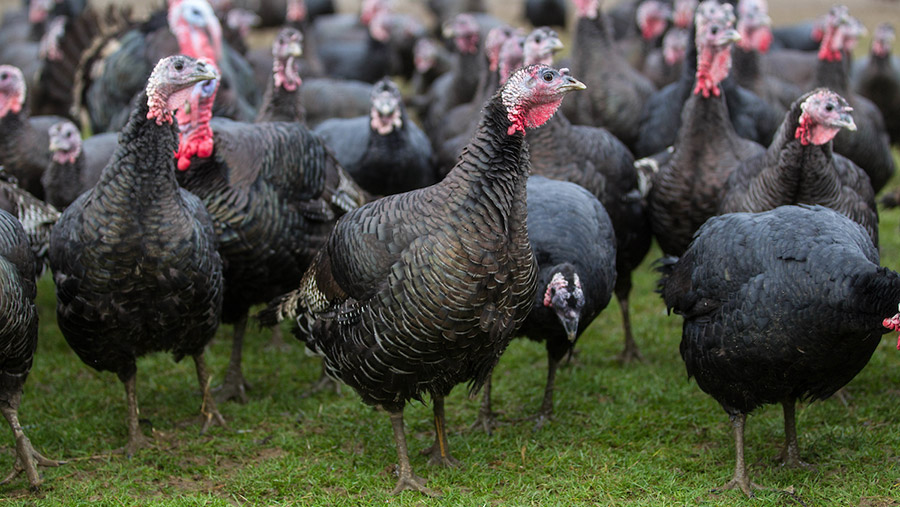Half of UK free-range Christmas turkeys lost to avian flu
 © Tim Scrivener
© Tim Scrivener Half of all free-range turkeys and geese being grown on UK farms for Christmas have been culled or died due to avian influenza, MPs have been told.
Out of an estimated 1.3 million free-range birds on farms, 600,000 have been lost to the virus, a parliamentary hearing of the Environment, Food and Rural Affairs (Efra) committee heard on Tuesday 29 November.
For indoor systems the effect is less severe, with about 1 million mortalities among the 8.5-9 million birds destined for sale, said Richard Griffiths, chief executive of the British Poultry Council.
See also: Welsh poultry farmers brace for imminent bird housing order
The financial consequences for food production and for the farming industry were “potentially enormous”, Mr Griffiths said.
“I don’t know how the gaps in retail are going to be filled,” he admitted.
Consequently, the spot market for imported turkey has doubled. About 36% of all UK poultry farms are currently subject to some form of control.
Going forward, Mr Griffiths anticipates a move away from free-range to indoor systems. “I fear for the future of free-range production as a whole,” he said.
However, for UK Christmas turkey production, he believes overall numbers will be maintained by that shift to indoor production.
The NFU and the poultry industry is lobbying the government for a compensation scheme that matches the highly pathogenic nature of the H5N1 strain of the disease.
Financial hit
Turkey producer Paul Kelly, of Kelly Turkeys, based in Essex, estimated his business has taken a £1.2m financial hit this year due to the virus.
Without a compensation scheme that is fit for purpose, as well as a vaccination programme, many farmers won’t have the confidence to grow Christmas poultry next year, Mr Kelly said.
“They have lost so much money, they can’t risk it again or they will go bust,” he told the committee.
The compensation scheme – first introduced in 1981, when avian flu was a low-pathogenic virus – only pays farmers for birds that are healthy at the time of culling.
Mr Kelly said that with the highly pathogenic virus now circulating, many farmers were not receiving a penny in compensation.
He cited the example of an outbreak at one of his sites, when there were initially 20 mortalities in a 9,500-head flock on a Thursday.
“By the following morning they were dropping like flies,” he said. “We reported it that morning, the vet came out and took bloods.”
The results were available the following Monday morning, but by lunchtime all the birds had died from the infection, so he was not entitled to compensation.
“The compensation scheme revolves around fit and healthy birds when Apha [government vets] arrive to cull,” said Mr Kelly.
Businesses were being “wiped out”, he said. However, he insisted the industry didn’t want to rely on compensation, but rather wanted progress to be made on vaccination.
“Fast-tracking the vaccine is the solution to all of our problems, for the taxpayer and the farming industry,” he said.
“Everyone has accepted now that we have lost the battle, we have lost the war, and we have to vaccinate. Whatever it takes to make that happen, if we could fast-track that I think the industry would be in a much better place in the coming months.”
Vaccine ‘hurdles’
There are two vaccines currently authorised for use in England on some zoo birds in certain circumstances, but vaccination is prohibited in Wales and Scotland.
Defra chief veterinary officer Christine Middlemiss said work was ongoing around vaccination, but there were several hurdles, including the inability to distinguish between vaccinated and infected birds and the implications that had for trade.
“It is happening, but it’s not going to be overnight quick – it’s not going to be a silver bullet for this year,” she said.
The pressure the outbreak is having on Animal and Plant Health Agency (Apha) staffing resources also came under the spotlight at the hearing.
Some 25% of its entire capacity is currently being dedicated to dealing with avian flu, and it has drafted in 220 additional staff and recruited 42 locum vets for this season.
But Mr Kelly praised Defra and the Apha for their “exceptional” response to the outbreak. “What they have done, given the circumstances, has been fantastic,” he said.
